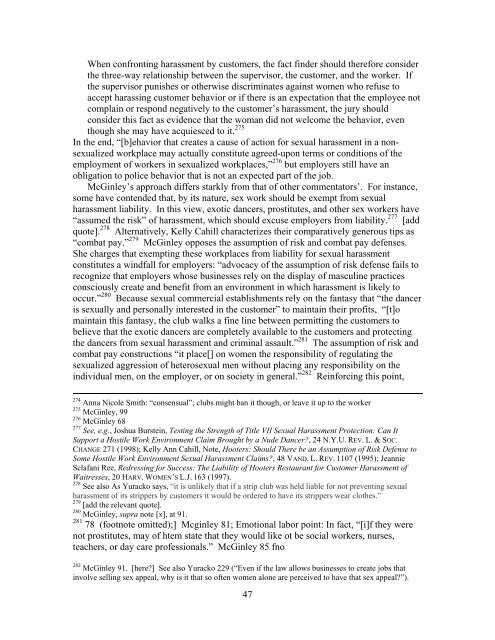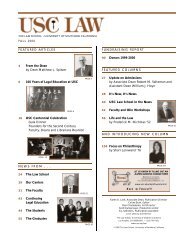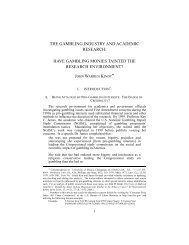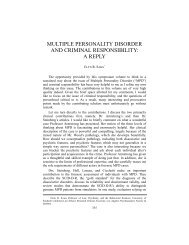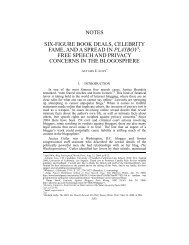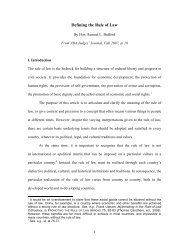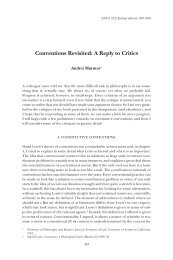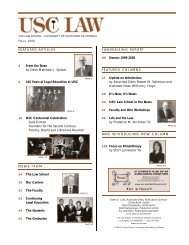1 Regulating Sex Work Adrienne D. Davis VERY ROUGH DRAFT ...
1 Regulating Sex Work Adrienne D. Davis VERY ROUGH DRAFT ...
1 Regulating Sex Work Adrienne D. Davis VERY ROUGH DRAFT ...
Create successful ePaper yourself
Turn your PDF publications into a flip-book with our unique Google optimized e-Paper software.
When confronting harassment by customers, the fact finder should therefore consider<br />
the three-way relationship between the supervisor, the customer, and the worker. If<br />
the supervisor punishes or otherwise discriminates against women who refuse to<br />
accept harassing customer behavior or if there is an expectation that the employee not<br />
complain or respond negatively to the customer’s harassment, the jury should<br />
consider this fact as evidence that the woman did not welcome the behavior, even<br />
though she may have acquiesced to it. 275<br />
In the end, “[b]ehavior that creates a cause of action for sexual harassment in a nonsexualized<br />
workplace may actually constitute agreed-upon terms or conditions of the<br />
employment of workers in sexualized workplaces,” 276 but employers still have an<br />
obligation to police behavior that is not an expected part of the job.<br />
McGinley’s approach differs starkly from that of other commentators’. For instance,<br />
some have contended that, by its nature, sex work should be exempt from sexual<br />
harassment liability. In this view, exotic dancers, prostitutes, and other sex workers have<br />
“assumed the risk” of harassment, which should excuse employers from liability. 277 [add<br />
quote]. 278 Alternatively, Kelly Cahill characterizes their comparatively generous tips as<br />
“combat pay.” 279 McGinley opposes the assumption of risk and combat pay defenses.<br />
She charges that exempting these workplaces from liability for sexual harassment<br />
constitutes a windfall for employers: “advocacy of the assumption of risk defense fails to<br />
recognize that employers whose businesses rely on the display of masculine practices<br />
consciously create and benefit from an environment in which harassment is likely to<br />
occur.” 280 Because sexual commercial establishments rely on the fantasy that “the dancer<br />
is sexually and personally interested in the customer” to maintain their profits, “[t]o<br />
maintain this fantasy, the club walks a fine line between permitting the customers to<br />
believe that the exotic dancers are completely available to the customers and protecting<br />
the dancers from sexual harassment and criminal assault.” 281 The assumption of risk and<br />
combat pay constructions “it place[] on women the responsibility of regulating the<br />
sexualized aggression of heterosexual men without placing any responsibility on the<br />
individual men, on the employer, or on society in general.” 282 Reinforcing this point,<br />
274 Anna Nicole Smith: “consensual”; clubs might ban it though, or leave it up to the worker<br />
275 McGinley, 99<br />
276 McGinley 68<br />
277 See, e.g., Joshua Burstein, Testing the Strength of Title VII <strong>Sex</strong>ual Harassment Protection: Can It<br />
Support a Hostile <strong>Work</strong> Environment Claim Brought by a Nude Dancer?, 24 N.Y.U. REV. L. & SOC.<br />
CHANGE 271 (1998); Kelly Ann Cahill, Note, Hooters: Should There be an Assumption of Risk Defense to<br />
Some Hostile <strong>Work</strong> Environment <strong>Sex</strong>ual Harassment Claims?, 48 VAND. L. REV. 1107 (1995); Jeannie<br />
Sclafani Ree, Redressing for Success: The Liability of Hooters Restaurant for Customer Harassment of<br />
Waitresses, 20 HARV. WOMEN’S L.J. 163 (1997).<br />
278 See also As Yuracko says, “it is unlikely that if a strip club was held liable for not preventing sexual<br />
harassment of its strippers by customers it would be ordered to have its strippers wear clothes.”<br />
279 [add the relevant quote].<br />
280 McGinley, supra note [x], at 91.<br />
281 78 (footnote omitted);] Mcginley 81; Emotional labor point: In fact, “[i]f they were<br />
not prostitutes, may of htem state that they would like ot be social workers, nurses,<br />
teachers, or day care professionals.” McGinley 85 fno<br />
282 McGinley 91. [here?] See also Yuracko 229 (“Even if the law allows businesses to create jobs that<br />
involve selling sex appeal, why is it that so often women alone are perceived to have that sex appeal?”).<br />
47


